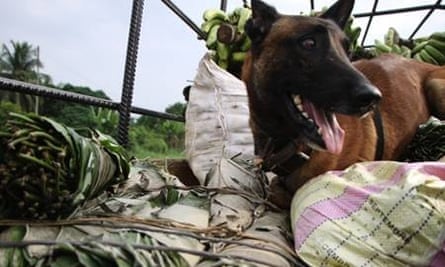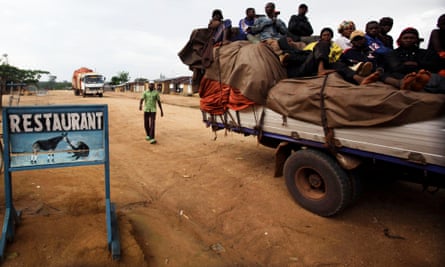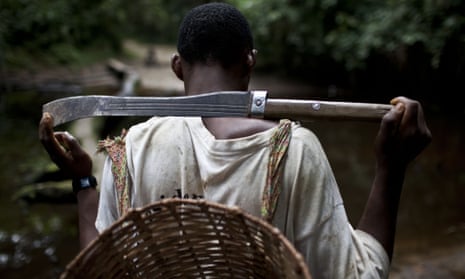At the entry points to Congo-Brazzaville’s second largest city and main port, three dogs, specially trained to detect wildlife products and weapons, are set to work.
Conditions are challenging for the canines and their handlers alike: high temperatures, uncooperative travellers, and vehicles loaded to the brim, often with strong-smelling mounds of manioc and smoked fish – which can disguise the odours of illicit cargo.
Despite this, the success rate is impressive. During the mission the dogs identified the location of an assortment of illegally hunted species, hidden beneath towering cargoes of people and luggage, headed for the bushmeat markets of Pointe-Noire.
This is the sniffer dog unit of a group that has been battling wildlife crime since 2008, and who are now hard at work to crack down on the illegal bush meat trade, believed to have been a major factor in the devastating spread of Ebola across west Africa in 2014, which killed more than 11,000 people.
Also known as wildmeat or game meat, the term refers to non-domesticated mammals, reptiles, amphibians and birds hunted for food.
The link between the meat and Ebola was made after it emerged that the first victim’s family hunted bats. The two-year-old child – dubbed “patient zero”, from the village of Gueckedou in south-eastern Guinea – died on 6 December 2013, and his family later said they had hunted two species of bat which were found to carry the virus.
Though reports had indicated that Ebola fears were receding – the WHO declared the outbreak over in May – new cases of the virus found on Wednesday in Liberia have raised concerns once again.

“With the help of the dogs, the team can now be in and out of a hot situation much more quickly, are more likely to find all the evidence needed for a case, and can ensure that wildlife-traffickers are caught red-handed – and don’t just stash their products before being caught,” says Arthur F Sniegon, a biologist from the Czech Republic, who has been coordinating the sniffer dog programme for the past year.
The trade in illegal bushmeat is big business. According to the Center for International Forestry Research, 5m tonnes of bushmeat are harvested from the Congo basin every year.
Wildlife impact
While for many Congolese bushmeat is a major source of protein, the environmental impact of the trade is devastating: the World Wildlife Fund points to the trade as the single biggest cause of wildlife loss in the region.
Diane Detoeuf of the Wildlife Conservation Society (WCS) recently surveyed bushmeat hunters on the Bateke Plateau, in southwestern Gabon, and reported that “a high percentage of hunters interviewed find it increasingly difficult to find the species they once hunted in abundance” – an indicator of how badly the trade has affected forest wildlife densities.
Congo-Brazzaville’s wildlife laws are among the most stringent in central Africa, but many people – including the authorities – continue to see wildlife primarily as a source of food and income, rather than either a potential point of infection or a natural resource that needs to be protected.

Convictions for wildlife crime can now lead to five years in jail, but this is still a low price to pay for those involved in such profitable activities. Furthermore, wildlife criminals seldom receive the maximum sentence, and the kingpins of the illegal wildlife trade are often not convicted at all.
This is exactly what the Project for the Application of Law for Fauna in the Republic of Congo (Palf) – and its sniffer dogs – is combatting. Working closely with other NGOs such as the WCS and the African Parks Network, they gain information on key players in the illicit trade, not only within Congo, but networks spreading into neighbouring countries too.
The addition of the three sniffer dogs to the team has hugely enhanced the efficacy of the project. Detecting illegal products in the chaos of a busy market is a challenge in itself, not to mention carrying out an operation and making arrests.
The Palf dogs spend an average of 20 days a month in the field, rotating between the Maya-Maya international airport in Brazzaville and the country’s main transport routes.
To date, the dog team has assisted with six arrests, discovered more than a tonne of bushmeat and over 100 live crocodiles, tortoises, pangolins and African grey parrots – a tribute to the hard work of a dedicated team of environmental and anti-corruption activists.
A version of this article originally appeared on the Daily Maverick, part of the Guardian Africa network

Comments (…)
Sign in or create your Guardian account to join the discussion